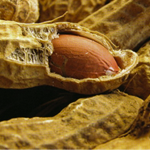Peanut Allergy Symptoms in Children
 These days allergic reaction to some item of food is quite common in children. Many items of food cause allergic reaction in children especially young children. Peanuts are one such item of food. The allergic reaction may be milder in some cases whereas in others it could be very severe resulting in anaphylaxis which could be fatal if not attended to timely. If a child has been found allergic to peanuts or some other item of food, the best cure is to avoid that particular item.
These days allergic reaction to some item of food is quite common in children. Many items of food cause allergic reaction in children especially young children. Peanuts are one such item of food. The allergic reaction may be milder in some cases whereas in others it could be very severe resulting in anaphylaxis which could be fatal if not attended to timely. If a child has been found allergic to peanuts or some other item of food, the best cure is to avoid that particular item.
Symptoms
In the case of children who are allergic to peanuts, when a child consumes peanuts in one form or the other many chemicals are released by the body which affect different parts of the body. Some of the symptoms could be:
- Vomiting.
- Diarrhea with acute abdominal pain.
- Swelling in throat, lips and face.
- Attack of asthma.
- Skin rashes and eczema.
- Anaphylactic shock.
The allergic reaction could appear within minutes of eating nuts or other products made of these nuts. In some cases the reaction may appear in hours. The initial symptoms are sneezing and tingling of tongue and lips and full symptoms follow soon.
Statistics point out that peanut related allergic reaction is the cause of maximum number of food related deaths. However peanut allergies are also found to correlate to race. Native Americans are less allergic to peanuts as compared to migrant Europeans in USA. Maximum chances of contracting this allergic reaction is by eating peanuts in any form, however reaction to some extent could be noticed as a result of external exposure. Some people suggest that the reaction could trigger as a result of touching or smelling peanut products. However by external touch the reaction could be minor. People exposed to processing of peanuts like shelling or grinding of peanuts could get a reaction and may develop minor rashes due to particles which go airborne during processing and these particles settling down on the skin.
Treatment
The best treatment for this allergic reaction is to keep the child away from consuming peanuts. In restaurants or school cafeterias where peanut butter is used, a separate table has been provided for people allergic to peanuts. To make the body accept peanuts, small particles are introduced in the body which grow slowly to desensitise the system and make it immune. This should be tried under strict medical supervision and under no circumstances tried at home. If your child is sensitive, do pay a visit to the doctor who can suggest some medicine to be kept with you for use in case of accidental consumption.
The doctor will ascertain from you about the time lapse between eating peanut products and appearance of symptoms, severity and period during which these symptoms last. He may also apply a drop of peanut oil on the back of the child to study the reaction for testing. If the skin turns red the child is definitely allergic. Generally the doctor will prescribe anti allergic drugs in minor cases. Depending upon the part affected the most, the medicine will be prescribed.
Some injectable drugs have been developed, and some over the counter drugs are also available in market, but it is always be better to avoid peanuts if your child is allergic.
Scientists have developed a process to make the peanuts totally free of allergies. Roasted kernels have been made 100% allergic free and safe for human consumption. This process does not have any effect on the taste or quality. These may be tried if available near you.